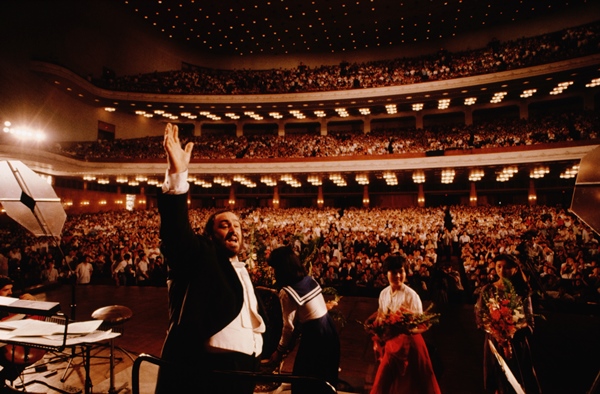
Luciano Pavarotti performing in Beijing, as seen in Pavarotti (Vittoriano Rastelli/Corbis/CBS Films)
Ron Howard had an all-access pass for his celebratory look back at the career of tenor Luciano Pavarotti. Perhaps as a result of the documentary arriving 12 years after the singer’s death from pancreatic cancer, enough time has passed from the tail end of his career, which was dominated by tabloid stories poking into his personal affairs and coverage lamenting his prolonged and bumpy departure from the opera stage, for a reassessment.
As the old chestnut goes, time heals all wounds, and that certainly holds true for Pavarotti’s first wife, Adua; their three grown daughters; and his second spouse, Nicoletta, with whom he had a daughter; and Madelyn Renée, his former student, secretary, and partner. Whatever acrimony there was, real or in the imagination of eager journalists, it has faded from memory in their plentiful, personal interviews. You may come for the gossip, but you’ll leave with reconciliation.
The focus is not solely on the persona, far from it. Howard offers an overview of Pavarotti’s remarkable performing career from the early 1960s until his death as a perhaps unlikely plus-size international superstar. (A voracious eater, the itinerant artist would pack Italian sausages, cheeses, and pasta in his suitcases.) When the film delves into his private life, it offers the singer’s fans something of an update among his survivors, but otherwise there is little that is new. Pavorotti serves more as an ideal introduction for opera newcomers as well as those who may not have been around at the singer’s zenith as a media star in the early to mid-1990s.
Like bullet points in a resume, Howard checks off Pavarotti’s achievements, ranging from his Covent Garden debut in 1963 as Rodolfo in La bohème, which put him on the map; to the singer’s career-changing collaboration with another powerhouse, Joan Sutherland, famously in Le fille du régiment; and the early stages of the singer’s tour of the American Midwest hinterlands, reaching out to audiences outside of the opera house. The boyish, charismatic everyman was one of a select few classical singers who crossed into the mainstream, joining his idol Enrico Caruso, Maria Callas, and Grace Moore, who was nominated for a Best Actress Academy Award (One Night of Love) in 1935. Strangely, Howard leaves out Pavarotti’s foray as a Hollywood leading man in the poorly reviewed box-office dud Yes, Giorgio, from 1982.
The film’s biggest selling point is the music—no surprise there—and hearing the plaintive tenor’s crystal clear, pinging high notes. The film embraces the music, and although opera fans might feel deprived of backstage gossip, in no way will they feel cheated musically. (Deborah Voigt is one singer who has a choice and amusing antidote of singing with Pavarotti, as he walked off stage in the middle of their duet, according to her 2015 autobiography Call Me Debbie.) However, for insider talk, Howard does have Carol Vaness, the ever-quotable soprano who sang Tosca to Pavarotti’s Cavaradossi, and the emphatic soprano Angela Gheorghiu, one of the few contemporary opera singers who has a personality offstage to match any of her dramatic roles.
This fond remembrance would also be an ideal tie-in for PBS or classical music stations’ fund-raising drives, as it covers many of the greatest hits of the tenor repertoire, which Pavarotti made his own, especially the arias of Puccini (the ubiquitous “Nessun dorma” from Turandot). Much will be familiar, even if viewers have never seen a staged opera, thanks to that Italian restaurant standby “O Sole Mio.” Left offscreen are Pavarotti’s ventures into lesser-known repertory, such as his triumphat the Metropolitan Opera in the title role of Mozart’s Idomeneo, when he dipped his toes into the late Baroque period.
Some of the performance footage is raw and homemade (video formats haven’t aged well), and much of it is filmed in an unflatteringly invasive close-up of the singer’s face. But regardless of the visual quality of some sequences, one can always close one’s eyes and simply listen to the music, Howard’s ace in his hand.
















Leave A Comment